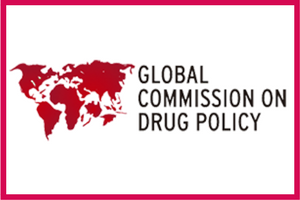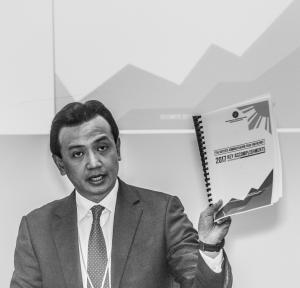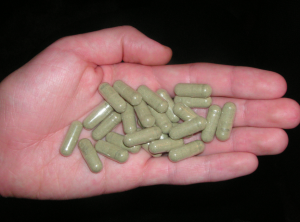The state criminal justice and Republican political establishment is opposed. Imagine that.
The former heads of state behind the Global Commission on Drugs, that's who.
Heâs at the UN to call for a more regressive global drug policy.
StoptheDrugWar.org condemns the Duterte administration's illegal move to imprison a second prominent drug war critic, and the court system's strained logic going along with it.
The DEA last week rescheduled the marijuana-based drug Epidiolex, California's governor vetoes a compassionate access bill, Michigan dispensaries must have licenses by Halloween or be shut down, and more.
It's prison guards gone bad this week, plus a crooked NYPD cop, and more.
A bad provision gets stripped out of the congressional opioid package, a Pennsylvania legislator files a legalization bill, Mexican Marines disarm Acapulco cops, and more.
The House GOP once again blocks a marijuana reform, the DEA reschedules a marijuana-based drug, Ontario sets its pot sales rules, and more.
Jerry Brown signs and vetoes drug bills, the drug czar's office confirms the existence of a secretive marijuana committee, Johns Hopkins researchers suggest psilocybin should be Schedule IV, and more.
Some members of Congress want to know why the DEA approves research marijuana imports but not research marijuana here, New Jersey's governor says legal pot is coming, California's governor vetoes a bill that would have let dispensaries give free samples to poor medical marijuana patients, and more.
The drug czar's office tells a US senator a multi-agency review of marijuana will be "objective," protestors target Rep. Andy Harris over his opposition to allowing medical marijuana to treat opioid addiction, Ohio regulators take a first step toward banning kratom, and more.
Congress sends an omnibus opioids bill to the president's desk, the DEA has another Colombia scandal, the San Francisco police and Los Angeles sheriff's deputies face charges of racial profiling, and more.
Progressive voters in battleground Ohio will have one more reason to head to the polls next month. Not only do they have a chance to put a Democrat in the governor's mansion and reelect US Senator Sherrod Brown, but they also will have the opportunity to enact a dramatic sentencing reform that will keep thousands of non-violent drug offenders out of prison and help inmates currently serving time for drug possession get back into their communities sooner.
Issue 1, the smartly named Neighborhood Safety, Drug Treatment, and Rehabilitation Amendment, would:
- Reclassify drug possession offenses as misdemeanor crimes, except for drug possession or trafficking offenses currently categorized as first-, second- or third-degree felonies;
- Prohibit jail sentences for drug possession until an individual's third offense within 24 months;
- Allow inmates convicted of nonviolent crimes to reduce their sentences up to 25 percent for completing rehabilitative, work or educational programming;
- Apply cost savings from reduced prison expenses to drug treatment programs and crime victim services.
That's right, passage of Issue 1 would effectively defelonize drug possession in the Buckeye State. At least 16 states have already taken similar steps to ratchet down the drug war, including California, New York, and neighboring Pennsylvania. And now, thanks to local grassroots organizing backed by some big outside money, Ohio could be next.
It could use the help. The state's prison population has hovered around 50,000 for nearly two decades after rising dramatically during the height of drug war repression in the 1980s and 1990s, and nearly a quarter of inmates are doing time for drug offenses. Unsurprisingly, Ohio suffers the same sort of racial disparities as the rest of the country, with blacks more than five times as likely to be imprisoned as whites, and Latinos nearly twice as likely. The state's resort to mass incarceration costs it around $2 billion a year in corrections costs.
The initiative is the brainchild of the Ohio Organizing Collaborative, a coalition of 20 community organizations, faith institutions, labor unions, and policy groups across the state, and its Ohio Safe and Healthy Communities campaign. Its aim is to reduce mass incarceration and racial disparities in the criminal justice system and increase access to drug treatment.
Issue 1 would "invest in proven treatment for addiction instead of more spending on bloated prisons," explained campaign manager Amanda Hoyt.
While the initiative is homegrown, the funding for it is coming mainly from out-of-staters. Facebook founder Mark Zuckerberg's Chan Zuckerberg Initiative has kicked in $1 million, and Facebook co-founder Dustin Moskovitz's Open Philanthropy Project ponied up another $1 million. George Soros's Open Society Policy Center provided $1.5 million, while California businessman Nicholas Pritzker and his wife Susan added another $60,000. Of the $4.8 million raised by the campaign, all but $19,000 came from out of state.
"Relying on incarceration to solve addiction and the conditions that drive lower-level crimes actually doesn't make communities safer, and it results in huge expenses to taxpayers with devastating impact to individuals, families, and entire communities," said Ana Zamora, criminal justice manager at the Chan Zuckerberg Initiative, in a statement.
Issue 1 will "put taxpayer dollars to better use by reducing reliance on prisons to address certain nonviolent offenses, including drug use and possession," Zamora added.
The opposition to Issue 1 isn't nearly as deep-pocketed, but it represents much of the state's criminal justice and Republican political establishment. No opposition political action committees have reported donations, but groups such as the Ohio Prosecuting Attorneys Association, the Ohio Common Pleas Judges' Association, the Association of Municipal and County Court Judges of Ohio, the Buckeye State Sheriff's Association, and the Ohio Association of Chiefs of Police have all come out against Issue 1.
And while Democratic gubernatorial candidate Richard Cordray has endorsed Issue 1, current Republican Gov. John Kasich, GOP gubernatorial candidate Mike DeWine, all the Republicans running for statewide office, and the state Republican Party itself have all announced their opposition.
"Unfortunately, Issue 1 is a one-sided proposal that will weaken the tools available to our elected representatives, county prosecutors, and judges to make and enforce laws. It will eliminate important incentives to encourage drug treatment for the addicted, and allow the drug dealers who prey on addiction to freely roam the streets," said former secretary of state Ken Blackwell in rhetoric typical of the opposition.
Other opponents resorted to hyperbolic "sends the wrong message" arguments. "The message to children is that these drugs are not dangerous; the message to drug dealers is that doing business in Ohio is low-risk," warned Louis Tobin, executive director of the prosecutors' association, and Paul Pfeifer, executive director of the Ohio Judicial Conference, in their official argument.
It must be noted that Issue 1 defelonizes only drug possession -- not drug distribution.
There has been no polling to determine what kind of support the measure has, at least none announced publicly. Will an energized Democratic base carry the day for Democrats and Issue 1 in a closely divided state on Election Day? That remains to be seen, but all those millions in campaign funds should help buy plenty of TV ads and influence voters in these final weeks. Stay tuned.
back to top
Even as US President Donald Trump was using the meeting Monday of the United Nations General Assembly to try to create a hardline global drug policy coalition, a group that includes a dozen former heads of state from countries around the planet issued a report urging governments to embrace alternatives to a "failed" repressive drug war. Instead, the group argued, countries should begin to try to implement regulated markets for illicit substances.

GCDP-Logo-Featured-Image.png
While Trump spoke in New York City, the Global Commission on Drug POLICY unveiled its report,
Regulation: The Responsible Control of Drugs, with a press conference in Mexico City, capital of a nation frequently scapegoated by Trump for America's drug crises, but which in reality has suffered mightily from the demons unleashed by drug prohibition. The county's death toll in a decade of heightened prohibition-related cartel and government violence now exceeds 200,000 -- the kind of figure associated more with festering civil wars than with law enforcement problems.
One of Mexico's former presidents, Ernesto Zedillo, is a member of the commission, established in 2011 by former U.N. Secretary-General Kofi Annan, along with former presidents and prime ministers of Brazil, Chile, Colombia, East Timor, Greece, Malawi, New Zealand, Nigeria, Poland, Portugal, and Switzerland. The group also includes notable global figures, such as Richard Branson and Mario Vargas Llosa, as well as American political names such as former Secretary of State George Schultz and former Federal Reserve Chairman Paul Volcker.
"A demand for drugs exists, and if it is not satisfied through legal ways, then it will be satisfied by the illegal market," said commission chair former Swiss President Ruth Dreifuss, "Prohibition has allowed criminal organizations to control the whole chain of drugs. Every region in the world suffers from violence induced by turf wars over production areas and transit routes, from corruption and connivance of state institutions, and from the laundering of drug money, which damages the legal economy and the functioning of democratic institutions."
In the report, the commission calls on policymakers to open local and national participatory processes to shape the reforms and collect evidence on the legal regulation of drugs. That's something incoming Mexican President-elect Andres Manuel Lopez Obrador has already begun with his town hall meetings on violence and his proposal of amnesty for non-violent traffickers and drug crop farmers.
"This report provides a coherent account of what the legal regulation of drugs can look like in a real-life context, based on scientific evidence and current regulatory frameworks for legal substances," said Dreifuss. "It draws particular attention to the risks associated with over-commercialization and the need to learn from mistakes in regulating alcohol, tobacco and prescription opioids."
The global leaders also call for the renegotiation of the international treaties that form the legal backbone of global drug prohibition. Not only do they encourage a repressive approach to the drug question where drug users and low-level dealers face stiff prison sentences, they are also increasingly out of touch with social and political realities. Uruguay, Canada, and nine American states have legalized marijuana in contravention of the treaties, and Bolivia does not acknowledge coca's inclusion in their drug schedules.
"The international drug control system has failed to achieve its own objectives in terms of the supply in and demand for drugs," said former New Zealand Prime Minister Helen Clark. "It needs to adapt quickly to the reality that an increasing number of states are calling for or have implemented reforms which are incompatible with the framework it established. The gap which has developed between the expectations created by that framework and the reality on the ground needs to be faced up to. A new system is urgently needed which will support countries to implement effective drug policies."
American drug reformers applauded the commission's call for a new approach.
"The war on drugs has been an abject failure that has had devastating consequences throughout the world," said Maria McFarland Sánchez-Moreno, executive director of the Drug Policy Alliance (DPA). "Amidst this backdrop, it is heartening to see experienced world leaders boldly step forward with innovative, forward-looking proposals that are grounded in human rights, health, and development."
In a world where Donald Trump's drug war photo-op at the UN gets the press, it's easy to forget that when it comes to drug policy, the global prohibitionist consensus has already crumbled. The commission's report is a salutary reminder that better ways exist -- if we can muster the political muscle to implement them.
[Disclosure: Drug Policy Alliance is a funder of the organization that publishes this newsletter.]
back to top
President Trump is in New York City for the United Nations General Assembly, but he's going to kick off his appearance with an unofficial event aimed at promoting a tougher global line on drugs. He will host a meeting on "The World Drug Problem," and countries that have agreed to sign on to a document circulated by the administration, "The Global Call to Action on the World Drug Problem," will be rewarded by being invited to the event and given the opportunity to "participate in a group photo" with the president.

The president goes to the UN to try to push global drug policy backward. (Creative Commons/Gage Skidmore)
"The purpose of this event is to demonstrate international political will to enhance efforts to effectively address and counter the serious threats posed by the world drug problem," says an August 31 diplomatic note
first reported by The Intercept.
In that note, the administration says it is already "collaborating" with a couple of dozen countries, but many of them are already proponents of harsh drug policy approaches. At least three of them -- China, Saudi Arabia, and Singapore -- are quick to resort to the death penalty for drug offenders, while others, such as Russia and the United Arab Emirates, are not exactly beacons of progressive drug policy. Yet other countries, including Costa Rica, India, and the United Kingdom, have signed on despite not hewing to draconian drug policy positions -- perhaps just to stay on the right side of the mercurial and vindictive Trump.
Unlike the UN drug policy process, which involves lengthy, finely detailed study, negotiation, and consensus-building among member states and civil society actors, Trump's Global Call is an attempt to impose the administration's hardline drug war positions on other countries. The cover letter accompanying the Global Call makes clear that the text of the document "is not open for discussion."
In Trump's Global Call to Action, states agree to develop "action plans" based on a "four-pronged strategy" of demand reduction, drug treatment, international cooperation, and cutting the supply of illicit drugs that reflects the global drug policy consensus of a decade or two ago -- not today.
Twenty years ago, the UN General Assembly Special Session (UNGASS) on Drugs ended with a call for "a drug-free world." That chimera, of course, never happened, and the UN's political declaration in 2009 ratcheted down the rhetoric, calling merely for demand reduction, supply reduction, and international cooperation -- language strikingly reminiscent of Trump's current Global Call. But by the 2016 UNGASS on Drugs, the global community had moved beyond pure drug war theater, explicitly tying drug policy to human rights, access to health care, and sustainable development and implicitly endorsing harm reduction. The words "harm reduction" didn't make it into the final UNGASS documents, but their spirit was present.
Trump's Global Call also reverts to the sort of "eliminationist" language regarding drug cultivation that many countries have been moving away from. The strategy wants to "reduce" drug demand, but "cut off the supply" of drugs by "stopping" their production. Such language implies the resort to repressive eradication measures aimed at poor peasants in the developing world, a policy that has failed for decade after decade.
Drug policy advocates are raising the alarm over the administration's moves.
"This Global Call to Action is a unilateral move orchestrated by the US government that shows utter disregard for multilateralism and regular UN processes of negotiation and consensus. This is clearly an example of Trump attempting to wade into the international drug policy debate and create a splashy camera-ready opportunity, carefully orchestrated to create the appearance of support from dozens of other countries," said Hannah Hetzer, senior international policy manager at the Drug Policy Alliance.
Holding the event at the UN provides a "veneer of multilateralism and global accord, but these trappings of multilateralism should not be mistaken for a new-found global drug policy consensus," the International Drug Policy Consortium declared. "Far from an effort at achieving mutual understanding and genuine consensus, it is an instance of heavy-handed US 'with us or against us' diplomacy."
The world need not leave global drug policy to the tender mercies of Donald Trump. In fact, it would be better off listening to one of the men who will address the Monday meeting: UN Secretary-General Antonio Guterres. As president of Portugal, Guterres oversaw that country's groundbreaking decriminalization of drug use and possession in 2001.
Or it could listen to the Global Commission on Drug Policy, which consists of the former presidents and prime ministers of Brazil, Chile, Colombia, East Timor, Greece, Malawi, Mexico, New Zealand, Nigeria, Poland, Portugal, and Switzerland. On Monday, the same day that Trump attempts to cement a repressive alliance, the commission is launching its new report, "Regulation: The Responsible Control of Drugs," which calls for reforming the prohibition-based global drug control system and examines how responsible regulation can take control of currently illegal drug markets.
"President Trump is the last person who should be defining the global debate on drug policy. From his support of Philippine President Rodrigo Duterte's brutal drug war to his call for the death penalty for people who sell drugs, Trump has shown complete disdain for human rights and international law," warned Hetzer. "Governments should be very wary of signing on to this document and showing up for the photo op at Trump's event."
[Disclosure: Drug Policy Alliance is a funder of the organization that publishes this newsletter.]
back to top
(UPDATE: Our statement was covered by two Philippine news outlets, Rappler and GMA.)

Senator Trillanes at our March 2018 event (photo courtesy Joey Tranchina)
FOR IMMEDIATE RELEASE: September 25, 2018
The Philippine court system failed a crucial test today, and human rights may be the gravest casualty. Last night (mid-afternoon Philippines time) a court ordered the arrest of Senator Antonio Trillanes, a fierce critic of President Rodrigo Duterte and his drug war which has claimed tens of thousands of lives. Trillanes is free on bail, but believes he is likely to be jailed in an upcoming court hearing in a related case.
Trillanes is the second opposition senator to face charges. In a similar situation, Senator Leila de Lima was incarcerated a year and a half ago on unsupported drug charges, half a year after President Duterte promised to "destroy" her. The case against de Lima was brought shortly after she had a confessed former member of Duterte's "Davao Death Squad" testify in the Justice Committee, one of two former DDS members to go public. Duterte promised a year ago to also "destroy" Senator Trillanes.
The legal pretexts for the administration's action against Trillanes have drawn broad criticism in the Philippine legal and human rights communities. Trillanes was the recipient with others of an amnesty grant in 2011 by then President Benigno Aquino (the equivalent of a presidential clemency or pardon in the US). He was a leader of a famous military mutiny in which soldiers in the "Magdalo" group occupied a building to protest corruption in the Gloria Arroyo administration, and less-covered issues including illegal military attacks on Filipino Muslims.
Trillanes served seven years before the amnesty, getting elected to the Senate the first time while still jailed. Arroyo turned out to be even more corrupt than the Magdalo soldiers had claimed, and was caught engaging in election-rigging in not one but two elections, but is now Speaker of the Philippine House of Representatives.
The Duterte administration issued a proclamation three weeks ago declaring Trillanes' amnesty to be revoked -- a wholly unconstitutional move, according to most observers -- claiming that he failed to submit an application or admit guilt. Despite news footage showing him turning in the application, an affidavit by the military official administering the amnesty process attesting that there was an application, and a certificate of amnesty granted by the government, Judge Elmo Alameda insisted that because Trillanes could not find a copy of the application, he couldn't prove that he had complied with the amnesty's conditions. Alameda was similarly unmoved by the point that it was the military that was obligated to keep track of the application, not Trillanes, and that it could have been removed from the files as part of a conspiracy by the administration.
StoptheDrugWar.org condemns the Duterte administration's blatantly political attack on Senator Antonio Trillanes. We further note that the day on which the president's arrest order was initially made public, was the same day Trillanes was leading a Senate hearing on government contracts issued to a firm owned by the family of Duterte Solicitor General Jose Calida. Evidence came out demonstrating that the amnesty revocation was initiated by Calida.
We are also concerned that the amnesty revocation threat can now be held over other members of the Magdalo movement, one of whom, Rep. Gary Alejano, is a likely candidate for the Senate as part of the opposition coalition, of which the Magdalo Party is an important plank. The congressional election in the Philippines is scheduled for May 2019, which is also when Trilllanes' term in the Senate expires.
Senator Trillanes joined our March 2018 event at the Commission on Narcotic Drugs annual meeting in Vienna, where he presented administration data suggesting that extrajudicial killings in President Duterte's drug war may exceed 20,000. Perversely, the Senator observed, the administration listed these killings among its "2017 Accomplishments."
"StoptheDrugWar.org is focused on the still-unfolding human rights crisis in the Philippines, and Senator Trillanes is one of a handful of leaders willing to aggressive confront that crisis. Whether he remains free to speak and campaign, or instead joins Senator de Lima as a symbol behind bars, we will continue to support his efforts," said StoptheDrugWar.org Executive Director David Borden.
"Trillanes told us in Vienna he expected political prosecutions to increase in pace during the second half of this year," Borden continued. "We are saddened that he is personally a victim of this. But it has already further mobilized the already energized Philippine opposition to Duterte, and it will also focus even greater world attention onto Duterte's crimes and depredations."
StoptheDrugWar.org is a US-based NGO with a focus on international drug policy, and which has advocated on the Philippines human rights situation since early 2017. Our educational nonprofit DRCNet Foundation has been in Special Consultative Status with the UN Economic and Social Council since 2016.
Footage of Senator Trillanes' presentation in Vienna is online at https://stopthedrugwar.org/philippines#vienna2018.
- END -
back to top
The DEA last week rescheduled the marijuana-based drug Epidiolex, California's governor vetoes a compassionate access bill, Michigan dispensaries must have licenses by Halloween or be shut down, and more.
National
DEA Reschedules Marijuana-Derived Drug Epidiolex. The DEA has rescheduled Epidiolex, a marijuana-derived drug manufactured by GW Pharmaceutical. The move comes after the FDA approved the drug in June and clears the way for GW to begin selling the drug. Epidiolex is the first FDA-approved drug derived from marijuana.
Congresspersons Want to Know Why DEA is Importing Research Marijuana. Fifteen members of Congress led by Reps. Matt Gaetz (R-FL) and Eric Swalwell (D-CA) sent a letter Monday to the DEA and Attorney General Sessions expressing "deep concern" over delays in approving domestic marijuana cultivation for research purposes even as the DEA has approved the importation of marijuana from Canada for research purposes.
Protestors Target Rep. Andy Harris Over Opposition to Using Medical Marijuana as Opioid Treatment. Red-capped protestors affiliated with the marijuana reform group DCMJ protested outside the office doors of Rep. Andy Harris (R-MD) Tuesday. DCMJ said the protestors were there to protest his opposition to using medical marijuana as a treatment for the opioid crisis. After Harris refused to meet with them, as fellow protestors waved signs accusing Harris of working for "Big Pharma," two women laid down in the hallway to represent friends who had fatally overdosed. One of the women was temporarily handcuffed. The smell of marijuana wafted through the air. Harris later complained that: "Today's aggression by protesters who disagree with my position on the legalization of recreational marijuana demonstrates the problem with political discourse today. We all must agree to have a civilized debate when disagreement occurs. My parents fled communist Eastern Europe where people with different political opinions were harassed and punished, and it has no place in America."
California
California Governor Vetoes Compassionate Access Bill. Gov. Jerry Brown (D) has vetoed Senate Bill 829, which would have allowed licensed marijuana retailers to "offer free cannabis or cannabis goods" to low-income medical marijuana payments. In his veto statement, Brown said the bill would violate the state's recreational marijuana law, but that logic left advocates confounded. "Nowhere does Prop. 64 say that it is intended to impede free donations of medicine to needy patients," commented CA NORML head Dale Gieringer. "The purposes and intents section of the initiative is clear that it pertains only to adult-use marijuana, and does not override Prop 215 [California's original medical marijuana law, passed in 1996]."
Florida
Florida Moves to Block Licensing Lawsuit. The state Department of Health is asking an appeals court to block a district judge from moving forward with a lawsuit where a nursery operator who was denied a cultivation license. The appeals court on Friday put the case on hold temporarily, with the nursery operator given until the end of the month to respond to the state's arguments that the lawsuit should be thrown out.
Michigan
Michigan Dispensaries Must Have Licenses by Halloween, Regulators Say. The state Department of Licensing and Regulatory Affairs has issued new emergency rules for dispensaries saying that if they haven't received a license by Halloween they could be forced to shut their doors. Also, any product not received in compliance with the Marihuana Facilities Licensing Act will have to be destroyed.
Utah
Utah Medical Marijuana Initiative Opponents Pony Up Cash. Opponents of the Prop 2 medical marijuana initiative are ponying up big bucks in a bid to defeat the measure. As of last weekend, wealthy Utahns have contributed $230,000 to the opposition group Drug Safe Utah in recent months and $65,000 to another anti group, the Truth About Proposition 2, while initiative sponsors the Utah Patients Coalition has raised only $68,000, with $50,000 of that coming from the Marijuana Policy Project.
[For extensive information about the medical marijuana debate, presented in a neutral format, visit MedicalMarijuana.ProCon.org.]
back to top
It's prison guards gone bad this week, plus a crooked NYPD cop, and more. Let's get to it:
In Ocala, Florida, a state prison guard trainee was arrested last Wednesday for allegedly having sex with an inmate in exchange for drugs. Trainee Nicholas Seaborn Jefferson admitted twice having sex with a woman, who was repaying him for bringing her suboxone. He is charged with two counts of sexual misconduct.In Johnstown, Pennsylvania, a Johnstown police detective was arrested last Wednesday on charges he interfered in police business to protect a confidential informant of his. Detective Daniel Fisher Jr. allegedly intervened in the arrest of his female snitch, with whom he is accused of having a sexual relationship. He faces three misdemeanor counts, including hindering prosecution, and providing false information.
In Ridgeland, South Carolina, two state prison guards were arrested last Wednesday on charges they attempted to bring drug contraband to prisoners. Guards Shavonia Sharay Glaze and Amanda Nicole Wells now face charges. Glaze is charged with cocaine possession and furnishing contraband to a prisoner, while Wells is charged with misconduct in office, furnishing contraband to a prisoner, drug possession, and criminal conspiracy.
In Okeechobee, Florida, a state prison guard was arrested last Thursday for allegedly accepting bribes to smuggle in contraband into the prison. Guard Jeremiah Payne was allegedly bribed not only with cash, but also with synthetic cannabinoids in return for his help. He is now charged with bribery, possession of a controlled substance, possession of marijuana under 20 grams, and attempted introduction of contraband into a correctional facility.
In New York City, a former NYPD officer was sentenced last Wednesday to six years in prison for taking bribes and ferrying cocaine for an informant posing as a drug dealer. Johnny Diaz, 48, copped to possession of a controlled substance, bribe receiving and petit larceny in a plea deal. He went down when investigators posing as drug dealers offered him bribes and he took them up on their offer.
back to top
A bad provision gets stripped out of the congressional opioid package, a Pennsylvania legislator files a legalization bill, Mexican Marines disarm Acapulco cops, and more.

The Mexican military disarms all the cops in Acapulco amidst allegations of drug gang links. (Creative Commons)
Pennsylvania State Rep Files Bill to Legalize Marijuana. State Rep. Jake Wheatley (D-Allegheny) has introduced a bill to legalize marijuana for adults and expunge the records of people convicted of past pot-related crimes. "My bill would immediately release people jailed for crimes associated with cannabis," Wheatley said in a news release. "Those who have criminal histories related to cannabis would be expunged, and professional and driver's licenses that were revoked or suspended due to cannabis-related crimes would be reinstated. For far too long, the criminal justice system has unfairly punished Pennsylvanians, especially minorities, who are caught with cannabis." The bill also would create a system of taxed and regulated marijuana commerce. It's not yet available on the legislative website.
Drug Policy
Damaging Drug War Provision Excluded From Congressional Opioid Package. Late last night, the final text for the Congressional opioid package was released. SITSA, a sweeping bill expanding penalties on synthetic drugs and the broader war on drugs -- passed the House in July, and was expected to be included in the final bill. But a coalition of drug policy and criminal justice reform groups managed to push back against its inclusion, successfully keeping it out of the bill. "This is a huge win for public health over outdated drug war approaches," said Michael Collins of the Drug Policy Alliance's national office. "The bill would have expanded mass incarceration, while worsening the overdose crisis. It would have given Jeff Sessions unprecedented powers to schedule drugs and set draconian new criminal penalties. To pull this back from the brink after it easily passed the House only two months ago is a tremendous victory."
Pennsylvania Supreme Court to Decide Whether Maternal Drug Use Equals Child Abuse. The state's highest court on Tuesday began weighing whether women who abuse drugs during their pregnancies can be punished under state law as child abusers. The court has never addressed the matter, which is again igniting debate as the opioid crisis spawns a new generation of babies born dependent on their mothers' drugs. The justices heard oral arguments in the case of a woman who gave birth in January 2017 to a child who spent 19 days in the hospital being treated for drug withdrawal. The woman had tested positive for marijuana, opioids, and anxiety drugs. The child was taken into custody by Children and Youth Services, and the mother was charged with child abuse.
New Psychoactive Substances
DC Mayor Backs Bill Penalizing Dealers of Synthetic Cannabinoids. Mayor Muriel Bowser has proposed emergency legislation to go after dealers in synthetic cannabinoids as the District suffers from a spike in "fake weed" overdoses. "This is not marijuana," Bowser said at a Tuesday news conference. "The effects are very different, and they can be deadly." The city already prohibits the sale of synthetic drugs, but this bill would expand that ban.
International
Mexican Marines Disarm Entire Acapulco Police Force Over Links to Drug Gangs. Authorities in the state of Guerrero disarmed and placed under investigation the entire police force of Acapulco, the state's largest city, claiming the local police were infiltrated by drug gangs. Two top Acapulco police commanders were also charged with homicide. Last year, Acapulco had a murder rate of 103 per 100,000 residents, one of the highest in the world.
Venezuela Calls on Colombia to Take Action on Drug Trafficking. The Foreign Ministry called Tuesday for its eastern neighbor to "assume international responsibilities for the damage caused by the drug trafficking industry." Caracas wants Bogota to redouble its anti-trafficking efforts in light of the "alarming increase" in coca cultivation in Colombia reported by the UN Office on Drugs and Crime last week. "For the government of the Bolivarian Republic of Venezuela, it is even more worrisome that, according to said report, one of the most affected departments is precisely the north of Santander, bordering Venezuela, from where groups of drug trafficking and paramilitary violence are constantly attacking the population, the economy, and Venezuelan institutions. Venezuela urges the Colombian authorities to make sincere and effective efforts to assume international responsibilities for the damage caused by the drug trafficking industry to neighboring countries and the world," the ministry said.
[Disclosure: Drug Policy Alliance is a funder of the organization that publishes this newsletter.]
back to top
The House GOP once again blocks a marijuana reform, the DEA reschedules a marijuana-based drug, Ontario sets its pot sales rules, and more.
Marijuana PolicyHouse Committee Blocks Marijuana Tax Relief Bill. The House Rules Committee, led by Rep. Pete Sessions (R) has voted down an amendment that would allow marijuana businesses to deduct business expenses like any other businesses. The amendment would have exempted pot businesses from a federal tax provision -- 280E -- aimed at preventing drug cartel leaders from writing off yachts and other luxury items as business expenses, but now forces state-legal marijuana businesses to pay an effective tax rate of up to 70%.
California Bill to Allow Pot Sales, Consumption at Special Events Becomes Law. Gov. Jerry Brown (D) has signed into law Assembly Bill 2020, which "authorizes a state licensing authority to issue a state temporary event license to a licensee authorizing onsite cannabis sales to, and consumption by, persons 21 years of age or older at a county fair or district agricultural association event, provided that certain other requirements are met."
New Hampshire Could Gain $58 Million a Year from Legal Pot. The state Department of Revenue Administration has released a new estimate of tax revenues if the state legalizes marijuana. The department said the state could take in $58 million a year, although it acknowledged actual revenues would depend on a range of factors, including how high taxes are set in the first place.
Medical Marijuana
DEA Reschedules Marijuana-Derived Drug Epidiolex. The DEA has rescheduled Epidiolex, a marijuana-derived drug manufactured by GW Pharmaceutical. The move comes after the FDA approved the drug in June and clears the way for GW to begin selling the drug. Epidiolex is the first FDA-approved drug derived from marijuana.
International
Canada's Largest Province Sets Rules for Retail Marijuana Sales. Officials in Ontario on Wednesday unveiled rules to govern retail marijuana sales in the country's most populous province. There will be no cap on the number of pot shops, but large marijuana producers will be limited to one shop each. Pot shops will be operated by private companies but will have to buy their marijuana from the provincial government. Ontario accounts for 40% of all Canadian pot sales, according to Statistics Canada.
back to top
Jerry Brown signs and vetoes drug bills, the drug czar's office confirms the existence of a secretive marijuana committee, Johns Hopkins researchers suggest psilocybin should be Schedule IV, and more.

California Gov. Jerry Brown (D) has been very busy lately. (Facebook)
White House Confirms It's Been Running An Anti-Marijuana Committee. The White House Office of National Drug Control Policy (ONDCP -- the drug czar's office) has confirmed the existence of a secretive committee operated from the White House with an agenda to portraying marijuana as a national threat and propagating negative attitudes toward the drug and its users. The existence of the committee was revealed by Buzzfeed News last month, and ONDCP confirmed its existence in a letter to Sen. Michael Bennet (D-CO), who inquired after the initial media report. ONDCP claims the work of the committee will be unbiased.
California Governor Signs Cannabis Equity Act into Law. Gov. Jerry Brown (D) has signed into law Senate Bill 1294, the Cannabis Equity Act. The law aims to reverse some of the damaging impacts marijuana prohibition has had on people from disadvantaged communities. It is the first social equity marijuana law passed in the United States. Four California cities -- Los Angeles, Oakland, Sacramento, and San Francisco -- have already established local equity programs, and they will be well-placed to receive funding under this new law.
Michigan Poll Has Legalization Initiative Winning. A new poll from EPIC/MRA for the Detroit Free Press has the Proposal 1 marijuana legalization initiative winning the support of 55% of respondents, with 41% opposed. While that is a fairly comfortable lead, it is down from the 61% support reported by the same pollsters in a March poll.
Medical MarijuanaUtah Medical Marijuana Initiative Opponents Pony Up Cash. Opponents of the Prop 2 medical marijuana initiative are ponying up big bucks in a bid to defeat the measure. Wealthy Utahns have contributed $230,000 to the opposition group Drug Safe Utah in recent months and $65,000 to another anti group, the Truth About Proposition 2, while initiative sponsors the Utah Patients Coalition has raised only $68,000, with $50,000 of that coming from the Marijuana Policy Project.
Hemp
California Governor Signs Hemp Bill. Gov. Jerry Brown (D) has signed into law Senate Bill 1409, which clarifies the state's existing hemp laws. The law ends some certification requirements on hemp seed cultivars and restriction on how hemp can be produced.
Psychedelics
Johns Hopkins Researchers Suggest Psilocybin Should Be Reclassified as Schedule IV. In an evaluation of the safety and abuse research on psilocybin, the psychoactive ingredient in magic mushrooms, researchers at Johns Hopkins University suggested that if the drug clears clinical trials, it should be scheduled as Schedule IV, like prescription sleeping aids. It is currently classified as Schedule I, a drug with no known medical potential and a high potential for abuse.
Harm Reduction
California Governor Vetoes Safe Injection Site Bill. Gov. Jerry Brown (D) has vetoed Assembly Bill 186, which would have allowed San Francisco to open overdose prevention services that would let drug users use controlled substances under the supervision of staff trained to treat and prevent drug overdose and link people to drug treatment, housing, and other services. "I am shocked that the Governor turned his back on the science and the experts and instead used outdated drug war ideology to justify his veto," said Laura Thomas, Interim State Director of the Drug Policy Alliance. "He cited long-disproven ideas about substance use in his veto message rationale. It's disturbing that Governor Brown apparently believes these myths about the need for coercive treatment and even more disturbing that people will die because of his veto. Drug overdose is the leading cause of accidental death in California. How many people have to die before Governor Brown is willing to listen to the science and evidence and experience? How many families have to lose a loved one?"
Sentencing
California Governor Signs Bill Giving Judges Power to Set Aside Five-year Sentencing Enhancement. Gov. Jerry Brown (D) has signed into law Senate Bill 1393, the Fair and Just Sentencing Act. The bill will give state judges the discretion not to impose five-year sentencing enhancements if they feel they are unwarranted. "This new law is a crucial step in ending the mandatory use of failed and punitive policies from California's tough on crime era," said Eunisses Hernandez, Policy Coordinator at the Drug Policy Alliance. "This five-year enhancement is one of the most used enhancements in California; with close to 100,000 years applied to sentences of people in custody of the California Department of Corrections and Rehabilitation. California can and must continue to be a leader in repealing ineffective and punitive policies that waste millions in taxpayer dollars on incarceration, tear families apart, and fail to help our communities thrive."
back to top
Some members of Congress want to know why the DEA approves research marijuana imports but not research marijuana here, New Jersey's governor says legal pot is coming, California's governor vetoes a bill that would have let dispensaries give free samples to poor medical marijuana patients, and more.

New Jersey Gov. Phil Murphy says marijuana legalization is coming "sooner than later." (Creative Commons)
New Jersey Governor Says Legal Marijuana Coming Soon. Gov. Phil Murphy (D) said Monday that legalization is coming "sooner than later," with a vote possible within weeks. Last week, state Senate President Stephen Sweeney (D-Gloucester) said the Senate could vote by October 29, even though a new legalization bill hasn't been formally introduced yet. But the Assembly would have to vote to approve it, too, and there's no word on when that might happen.
Medical Marijuana
Congresspersons Want to Know Why DEA is Importing Research Marijuana. Fifteen members of Congress led by Reps. Matt Gaetz (R-FL) and Eric Swalwell (D-CA) have sent a letter to the DEA and Attorney General Sessions expressing "deep concern" over delays in approving domestic marijuana cultivation for research purposes even as the DEA has approved the importation of marijuana from Canada for research purposes.
California Governor Vetoes Compassionate Access Bill. Gov. Jerry Brown (D) has vetoed Senate Bill 829, which would have allowed licensed marijuana retailers to "offer free cannabis or cannabis goods" to low-income medical marijuana payments. In his veto statement, Brown said the bill would violate the state's recreational marijuana law, but that logic left advocates confounded. "Nowhere does Prop. 64 say that it is intended to impede free donations of medicine to needy patients," commented CA NORML head Dale Gieringer. "The purposes and intents section of the initiative is clear that it pertains only to adult-use marijuana, and does not override Prop 215 [California's original medical marijuana law, passed in 1996]."
Florida Moves to Block Licensing Lawsuit. The state Department of Health is asking an appeals court to block a district judge from moving forward with a lawsuit where a nursery operator who was denied a cultivation license. The appeals court on Friday put the case on hold temporarily, with the nursery operator given until the end of the month to respond to the state's arguments that the lawsuit should be thrown out.
Michigan Dispensaries Must Have Licenses by Halloween, Regulators Say. The state Department of Licensing and Regulatory Affairs has issued new emergency rules for dispensaries saying that if they haven't received a license by Halloween they could be forced to shut their doors. Also, any product not received in compliance with the Marihuana Facilities Licensing Act will have to be destroyed.
back to top
The drug czar's office tells a US senator a multi-agency review of marijuana will be "objective," protestors target Rep. Andy Harris over his opposition to allowing medical marijuana to treat opioid addiction, Ohio regulators take a first step toward banning kratom, and more.

Ohio regulators want to ban kratom. If they succeed, the state will be the seventh to have done so. (Creative Commons)
White House Vows Objective Marijuana Study, Colorado Senator Says. Sen. Michael Bennett (D-CO) said Monday that the Office of National Drug Control Policy (ONDCP -- the drug czar's office) has offered assurances that a federal marijuana policy panel will be objective and dispassionate as it reviews the impact of legalization in some states. The request for assurance came after Buzzfeed last month reported that the panel had asked 14 federal agencies and the DEA to submit "data demonstrating the most significant negative trends" about marijuana and its national "threat."
Michigan Bill to Ban Marijuana-Infused Alcohol Drinks Goes to Governor's Desk. The House on Tuesday approved House Bill 4668, which would bar the use, possession or sale of marijuana-infused beer, wine, liquor, and mixed drinks. That was the final legislative vote on the bill. The House had approved it earlier, then the Senate amended it, and now the House has approved those changes. The bill now goes to the desk of Gov. Rick Snyder (R). Foes of the bill say it addressed a problem that doesn't exist.
Medical Marijuana
Protestors Target Rep. Andy Harris Over Opposition to Using Medical Marijuana as Opioid Treatment. Red-capped protestors affiliated with the marijuana reform group DCMJ protested outside the office doors of Rep. Andy Harris (R-MD) Tuesday. DCMJ said the protestors were there to protest his opposition to using medical marijuana as a treatment for the opioid crisis. After Harris refused to meet with them, as fellow protestors waved signs accusing Harris of working for "Big Pharma," two women laid down in the hallway to represent friends who had fatally overdosed. One of the women was temporarily handcuffed. The smell of marijuana wafted through the air. Harris later complained that: "Today's aggression by protesters who disagree with my position on the legalization of recreational marijuana demonstrates the problem with political discourse today. We all must agree to have a civilized debate when disagreement occurs. My parents fled communist Eastern Europe where people with different political opinions were harassed and punished, and it has no place in America."
Kratom
Ohio Moves to Ban Kratom. The state Board of Pharmacy voted Monday to classify kratom as a Schedule I controlled substance after it concluded that the drug has no accepted medical use, a high potential for abuse, and is a public health risk. The Monday vote begins a months-long process of approving new rules and regulations for kratom. The board has already received more than 1,500 comments about the proposed ban, mostly in opposition. Six other states and the District of Columbia have banned kratom: Alabama, Arkansas, Indiana, Vermont, Rhode Island and Wisconsin. The board is accepting the first round of comments until October 18 at [email protected].
International
Jamaica Makes First Shipment of Medical Marijuana Extract to Canada. A shipment of medical marijuana extract oil has left Jamaica on route to Canada. The shipment was authorized through an import permit issued by the Canadian government via Health Canada and an export permit authorized by the Jamaican Ministry of Health. The shipment is the first step in Jamaica's bid to become a medical marijuana hub for the world.
back to top
Congress sends an omnibus opioids bill to the president's desk, the DEA has another Colombia scandal, the San Francisco police and Los Angeles sheriff's deputies face charges of racial profiling, and more.

Congress has sent an omnibus opioids bill to the president's desk. (Creative Commons)
Florida Judge Blocks Medical Marijuana License Process. A Tallahassee judge Wednesday agreed to block state health officials from moving forward with the application process for medical marijuana licenses. Leon County Circuit Court Judge Charles Dodson two months ago had found the state's licensing cap "directly contradicts" the amendment legalizing medical marijuana in the state and had set a Wednesday deadline for either health officials or the legislature to resolve deficiencies in the law. When that didn't happen, Dodson issued a verbal order halting the application process.
Utah Medical Marijuana Initiative Backers Reach Deal With Legislative Leaders, LDS Church Representatives, and Utah Medical Association. Backers of the Utah medical marijuana initiative joined other organizations and lawmakers at a press conference Thursday to announce they have reached an agreement on an alternative medical cannabis law that will be enacted in a special session following the election. Proposition 2 will still appear on the 2018 ballot, but it will no longer determine the final outcome for Utah medical cannabis patients. Instead, a compromise medical marijuana bill will be enacted during a special session after the 2018 election,
Heroin and Prescription Opioids
Senate Overwhelmingly Approves Sweeping Opioids Bill. The Senate Wednesday approved a sweeping opioids package on a 98-1 vote. The bill now goes to the desk of President Trump. The omnibus opioids bill combines dozens of smaller proposals and expands and reauthorizes programs and policies across the federal government, as well as creating new programs aimed at treatment, prevention, and recovery. One portion of the bill likely to have a big impact requires US postal inspectors to screen packages shipped from overseas -- mainly from China -- for fentanyl. The bill passed the House last week.
Law Enforcement
DEA Colombia Staff Facing Three Separate Misconduct Probes. At least three DEA agents based in Bogota have left in recent months amid separate investigations into alleged misconduct. One is accused of using government resources to hire prostitutes. Ironically, that agent, Robert Dobrich, the agency's top-ranking official in Latin American, was brought in in 2015 in the wake of a scandal about agents participating in sex parties with prostitutes. A former DEA agent assigned to Colombia, Jose Irizarry, is being investigated for passing information on to drug cartels. Irizarry resigned after his activities in Cartagena were curtailed earlier this year. Meanwhile, Dobrich's deputy, Jesse Garcia, is accused of having a sexual relationship with a subordinate.
ACLU Sues San Francisco Police Over Racially Motivated Drug Arrests. The ACLU of Northern California has filed a lawsuit on behalf of six black people arrested during anti-drug operations in the Tenderloin between 2013 and 2015. The six were among 37 arrested in the stings -- every one of whom was black -- and federal public defenders raised concerns over selective enforcement. The lawsuit cites a survey of Tenderloin drug users that found about half were black, but 20% were Latino and 17% were white. Charges against 12 of those arrested were dropped in January 2017 after a judge found there was "substantial evidence suggestive of racially selective enforcement, but the dropping of the charges meant a full accounting of police misconduct never happened.
Los Angeles County Deputies Accused of Racially Profiling Hispanics in I-5 Traffic Stop Drug Searches. LA County deputies stopped thousands of Latinos on the I-5 freeway in hopes of making their next drug bust, the Los Angeles Times reported Thursday. The sheriff's Domestic Highway Enforcement Team seized lots of drugs, but it also searched the vehicles of more than 3,500 drivers who had no drugs or other illegal items, the overwhelming majority of them Latino. Some of the teams' drug busts have been thrown out of federal court as the credibility of deputies came under fire and judges found they violated the rights of motorists by conducting unconstitutional searches. The Times examined data from every traffic stop done by the team from 2012 through 2017 -- more than 9,000 of them -- and found that Latinos accounted for 69% of stops, and that two-thirds of Latinos had their vehicles searched, compared to less than half of other drivers. Though Latinos were much more likely to be searched, deputies found drugs or other illegal items in their vehicles at a rate that was not significantly higher than that of black or white drivers. The sheriff's department said racial profiling "plays no role" in the deputies' work.
International
Canada Drug User, Advocacy Groups Call for Opioid Decriminalization. Some 93 groups representing drug users assembled in Edmonton this week have called for the federal government to move toward decriminalizing opioids. The coalition is calling for Ottawa to expand legal access to safe drugs for people with substance use disorder, decriminalize possession of all drugs for personal use, and expand the availability of harm reduction services.
back to top










